Right to be Forgotten: Examining Google's Role and Implications
VerifiedAdded on 2022/10/08
|7
|1655
|15
Essay
AI Summary
This essay examines the controversial 'right to be forgotten,' analyzing its implications for Google and the broader landscape of online information. It explores the legal and ethical dimensions of this right, particularly within the European context, where individuals can request the removal of personal data from search results. The essay delves into the arguments for and against this right, considering its potential impact on freedom of speech, public access to information, and the role of search engines like Google. It presents case studies and examples to illustrate the complexities involved, such as instances where delisting requests are made, the challenges Google faces in evaluating these requests, and the potential for misuse. Furthermore, the essay considers the perspectives of various stakeholders, including individuals seeking to protect their privacy, media organizations, and the public's right to know. The assignment also includes a review of social media marketing strategies and the role of social media in shaping public opinion and information dissemination. Ultimately, the essay aims to provide a comprehensive overview of the 'right to be forgotten,' its challenges, and its implications for the future of the internet and information access.

Paraphrase This Document
Need a fresh take? Get an instant paraphrase of this document with our AI Paraphraser
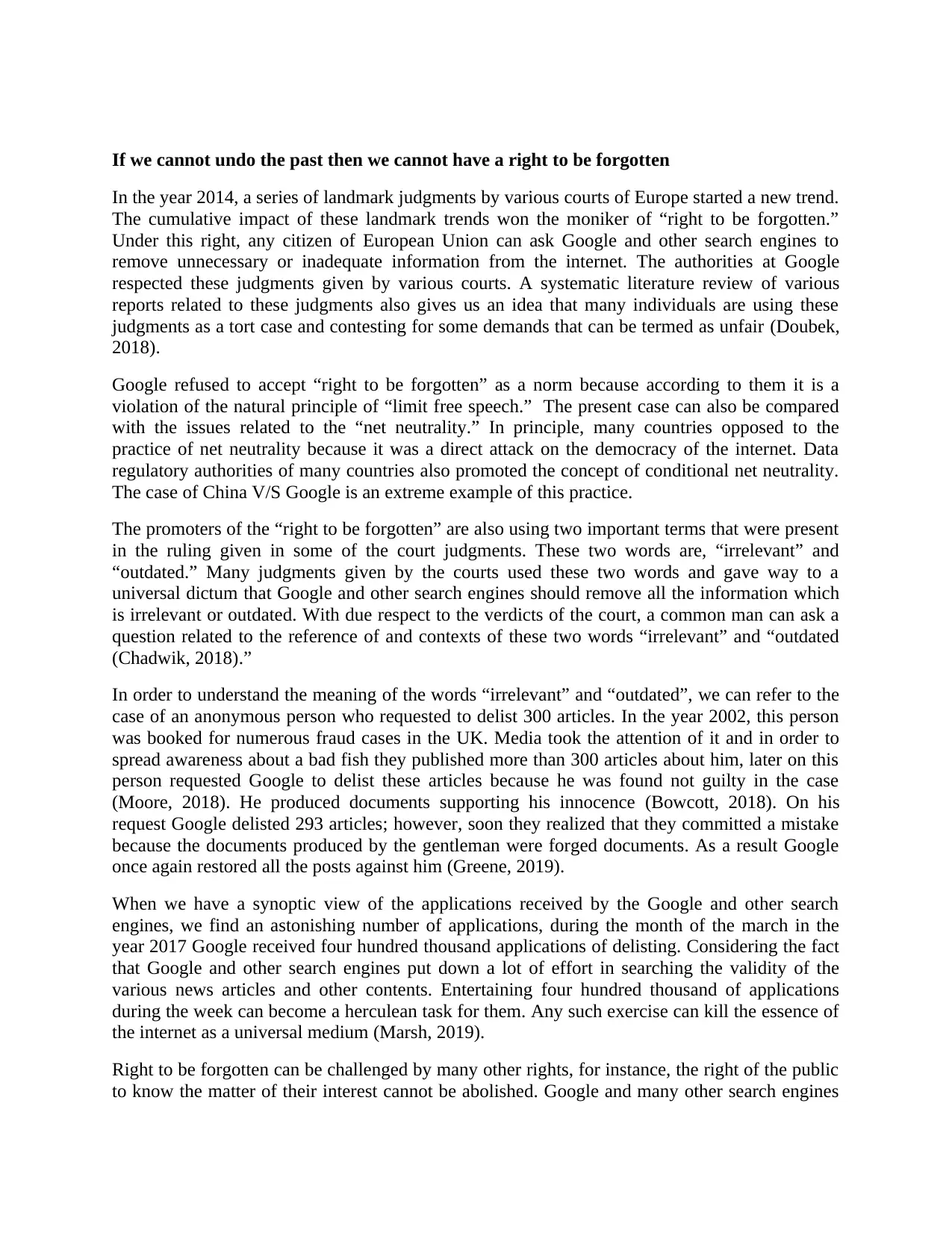
If we cannot undo the past then we cannot have a right to be forgotten
In the year 2014, a series of landmark judgments by various courts of Europe started a new trend.
The cumulative impact of these landmark trends won the moniker of “right to be forgotten.”
Under this right, any citizen of European Union can ask Google and other search engines to
remove unnecessary or inadequate information from the internet. The authorities at Google
respected these judgments given by various courts. A systematic literature review of various
reports related to these judgments also gives us an idea that many individuals are using these
judgments as a tort case and contesting for some demands that can be termed as unfair (Doubek,
2018).
Google refused to accept “right to be forgotten” as a norm because according to them it is a
violation of the natural principle of “limit free speech.” The present case can also be compared
with the issues related to the “net neutrality.” In principle, many countries opposed to the
practice of net neutrality because it was a direct attack on the democracy of the internet. Data
regulatory authorities of many countries also promoted the concept of conditional net neutrality.
The case of China V/S Google is an extreme example of this practice.
The promoters of the “right to be forgotten” are also using two important terms that were present
in the ruling given in some of the court judgments. These two words are, “irrelevant” and
“outdated.” Many judgments given by the courts used these two words and gave way to a
universal dictum that Google and other search engines should remove all the information which
is irrelevant or outdated. With due respect to the verdicts of the court, a common man can ask a
question related to the reference of and contexts of these two words “irrelevant” and “outdated
(Chadwik, 2018).”
In order to understand the meaning of the words “irrelevant” and “outdated”, we can refer to the
case of an anonymous person who requested to delist 300 articles. In the year 2002, this person
was booked for numerous fraud cases in the UK. Media took the attention of it and in order to
spread awareness about a bad fish they published more than 300 articles about him, later on this
person requested Google to delist these articles because he was found not guilty in the case
(Moore, 2018). He produced documents supporting his innocence (Bowcott, 2018). On his
request Google delisted 293 articles; however, soon they realized that they committed a mistake
because the documents produced by the gentleman were forged documents. As a result Google
once again restored all the posts against him (Greene, 2019).
When we have a synoptic view of the applications received by the Google and other search
engines, we find an astonishing number of applications, during the month of the march in the
year 2017 Google received four hundred thousand applications of delisting. Considering the fact
that Google and other search engines put down a lot of effort in searching the validity of the
various news articles and other contents. Entertaining four hundred thousand of applications
during the week can become a herculean task for them. Any such exercise can kill the essence of
the internet as a universal medium (Marsh, 2019).
Right to be forgotten can be challenged by many other rights, for instance, the right of the public
to know the matter of their interest cannot be abolished. Google and many other search engines
In the year 2014, a series of landmark judgments by various courts of Europe started a new trend.
The cumulative impact of these landmark trends won the moniker of “right to be forgotten.”
Under this right, any citizen of European Union can ask Google and other search engines to
remove unnecessary or inadequate information from the internet. The authorities at Google
respected these judgments given by various courts. A systematic literature review of various
reports related to these judgments also gives us an idea that many individuals are using these
judgments as a tort case and contesting for some demands that can be termed as unfair (Doubek,
2018).
Google refused to accept “right to be forgotten” as a norm because according to them it is a
violation of the natural principle of “limit free speech.” The present case can also be compared
with the issues related to the “net neutrality.” In principle, many countries opposed to the
practice of net neutrality because it was a direct attack on the democracy of the internet. Data
regulatory authorities of many countries also promoted the concept of conditional net neutrality.
The case of China V/S Google is an extreme example of this practice.
The promoters of the “right to be forgotten” are also using two important terms that were present
in the ruling given in some of the court judgments. These two words are, “irrelevant” and
“outdated.” Many judgments given by the courts used these two words and gave way to a
universal dictum that Google and other search engines should remove all the information which
is irrelevant or outdated. With due respect to the verdicts of the court, a common man can ask a
question related to the reference of and contexts of these two words “irrelevant” and “outdated
(Chadwik, 2018).”
In order to understand the meaning of the words “irrelevant” and “outdated”, we can refer to the
case of an anonymous person who requested to delist 300 articles. In the year 2002, this person
was booked for numerous fraud cases in the UK. Media took the attention of it and in order to
spread awareness about a bad fish they published more than 300 articles about him, later on this
person requested Google to delist these articles because he was found not guilty in the case
(Moore, 2018). He produced documents supporting his innocence (Bowcott, 2018). On his
request Google delisted 293 articles; however, soon they realized that they committed a mistake
because the documents produced by the gentleman were forged documents. As a result Google
once again restored all the posts against him (Greene, 2019).
When we have a synoptic view of the applications received by the Google and other search
engines, we find an astonishing number of applications, during the month of the march in the
year 2017 Google received four hundred thousand applications of delisting. Considering the fact
that Google and other search engines put down a lot of effort in searching the validity of the
various news articles and other contents. Entertaining four hundred thousand of applications
during the week can become a herculean task for them. Any such exercise can kill the essence of
the internet as a universal medium (Marsh, 2019).
Right to be forgotten can be challenged by many other rights, for instance, the right of the public
to know the matter of their interest cannot be abolished. Google and many other search engines
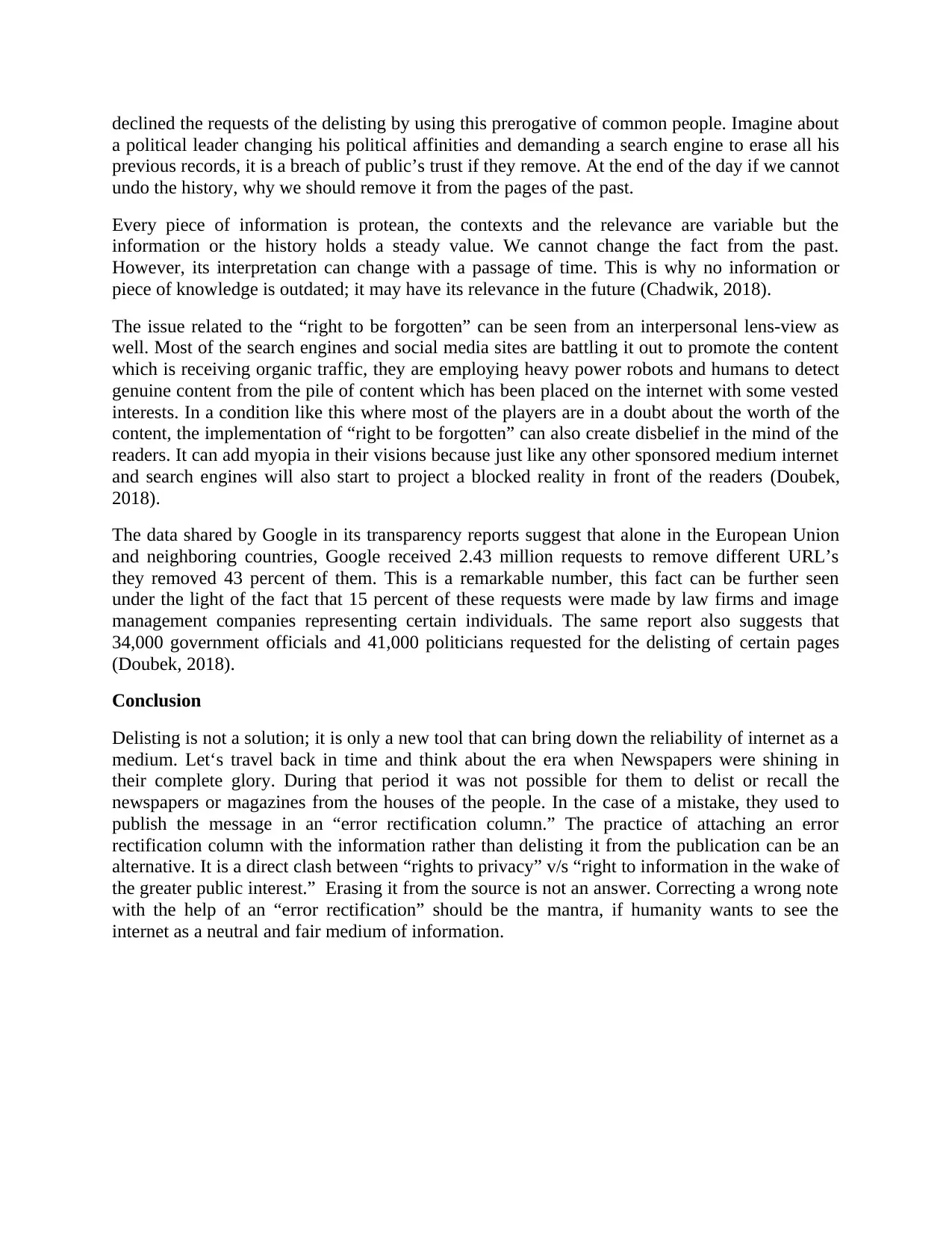
declined the requests of the delisting by using this prerogative of common people. Imagine about
a political leader changing his political affinities and demanding a search engine to erase all his
previous records, it is a breach of public’s trust if they remove. At the end of the day if we cannot
undo the history, why we should remove it from the pages of the past.
Every piece of information is protean, the contexts and the relevance are variable but the
information or the history holds a steady value. We cannot change the fact from the past.
However, its interpretation can change with a passage of time. This is why no information or
piece of knowledge is outdated; it may have its relevance in the future (Chadwik, 2018).
The issue related to the “right to be forgotten” can be seen from an interpersonal lens-view as
well. Most of the search engines and social media sites are battling it out to promote the content
which is receiving organic traffic, they are employing heavy power robots and humans to detect
genuine content from the pile of content which has been placed on the internet with some vested
interests. In a condition like this where most of the players are in a doubt about the worth of the
content, the implementation of “right to be forgotten” can also create disbelief in the mind of the
readers. It can add myopia in their visions because just like any other sponsored medium internet
and search engines will also start to project a blocked reality in front of the readers (Doubek,
2018).
The data shared by Google in its transparency reports suggest that alone in the European Union
and neighboring countries, Google received 2.43 million requests to remove different URL’s
they removed 43 percent of them. This is a remarkable number, this fact can be further seen
under the light of the fact that 15 percent of these requests were made by law firms and image
management companies representing certain individuals. The same report also suggests that
34,000 government officials and 41,000 politicians requested for the delisting of certain pages
(Doubek, 2018).
Conclusion
Delisting is not a solution; it is only a new tool that can bring down the reliability of internet as a
medium. Let‘s travel back in time and think about the era when Newspapers were shining in
their complete glory. During that period it was not possible for them to delist or recall the
newspapers or magazines from the houses of the people. In the case of a mistake, they used to
publish the message in an “error rectification column.” The practice of attaching an error
rectification column with the information rather than delisting it from the publication can be an
alternative. It is a direct clash between “rights to privacy” v/s “right to information in the wake of
the greater public interest.” Erasing it from the source is not an answer. Correcting a wrong note
with the help of an “error rectification” should be the mantra, if humanity wants to see the
internet as a neutral and fair medium of information.
a political leader changing his political affinities and demanding a search engine to erase all his
previous records, it is a breach of public’s trust if they remove. At the end of the day if we cannot
undo the history, why we should remove it from the pages of the past.
Every piece of information is protean, the contexts and the relevance are variable but the
information or the history holds a steady value. We cannot change the fact from the past.
However, its interpretation can change with a passage of time. This is why no information or
piece of knowledge is outdated; it may have its relevance in the future (Chadwik, 2018).
The issue related to the “right to be forgotten” can be seen from an interpersonal lens-view as
well. Most of the search engines and social media sites are battling it out to promote the content
which is receiving organic traffic, they are employing heavy power robots and humans to detect
genuine content from the pile of content which has been placed on the internet with some vested
interests. In a condition like this where most of the players are in a doubt about the worth of the
content, the implementation of “right to be forgotten” can also create disbelief in the mind of the
readers. It can add myopia in their visions because just like any other sponsored medium internet
and search engines will also start to project a blocked reality in front of the readers (Doubek,
2018).
The data shared by Google in its transparency reports suggest that alone in the European Union
and neighboring countries, Google received 2.43 million requests to remove different URL’s
they removed 43 percent of them. This is a remarkable number, this fact can be further seen
under the light of the fact that 15 percent of these requests were made by law firms and image
management companies representing certain individuals. The same report also suggests that
34,000 government officials and 41,000 politicians requested for the delisting of certain pages
(Doubek, 2018).
Conclusion
Delisting is not a solution; it is only a new tool that can bring down the reliability of internet as a
medium. Let‘s travel back in time and think about the era when Newspapers were shining in
their complete glory. During that period it was not possible for them to delist or recall the
newspapers or magazines from the houses of the people. In the case of a mistake, they used to
publish the message in an “error rectification column.” The practice of attaching an error
rectification column with the information rather than delisting it from the publication can be an
alternative. It is a direct clash between “rights to privacy” v/s “right to information in the wake of
the greater public interest.” Erasing it from the source is not an answer. Correcting a wrong note
with the help of an “error rectification” should be the mantra, if humanity wants to see the
internet as a neutral and fair medium of information.
⊘ This is a preview!⊘
Do you want full access?
Subscribe today to unlock all pages.

Trusted by 1+ million students worldwide
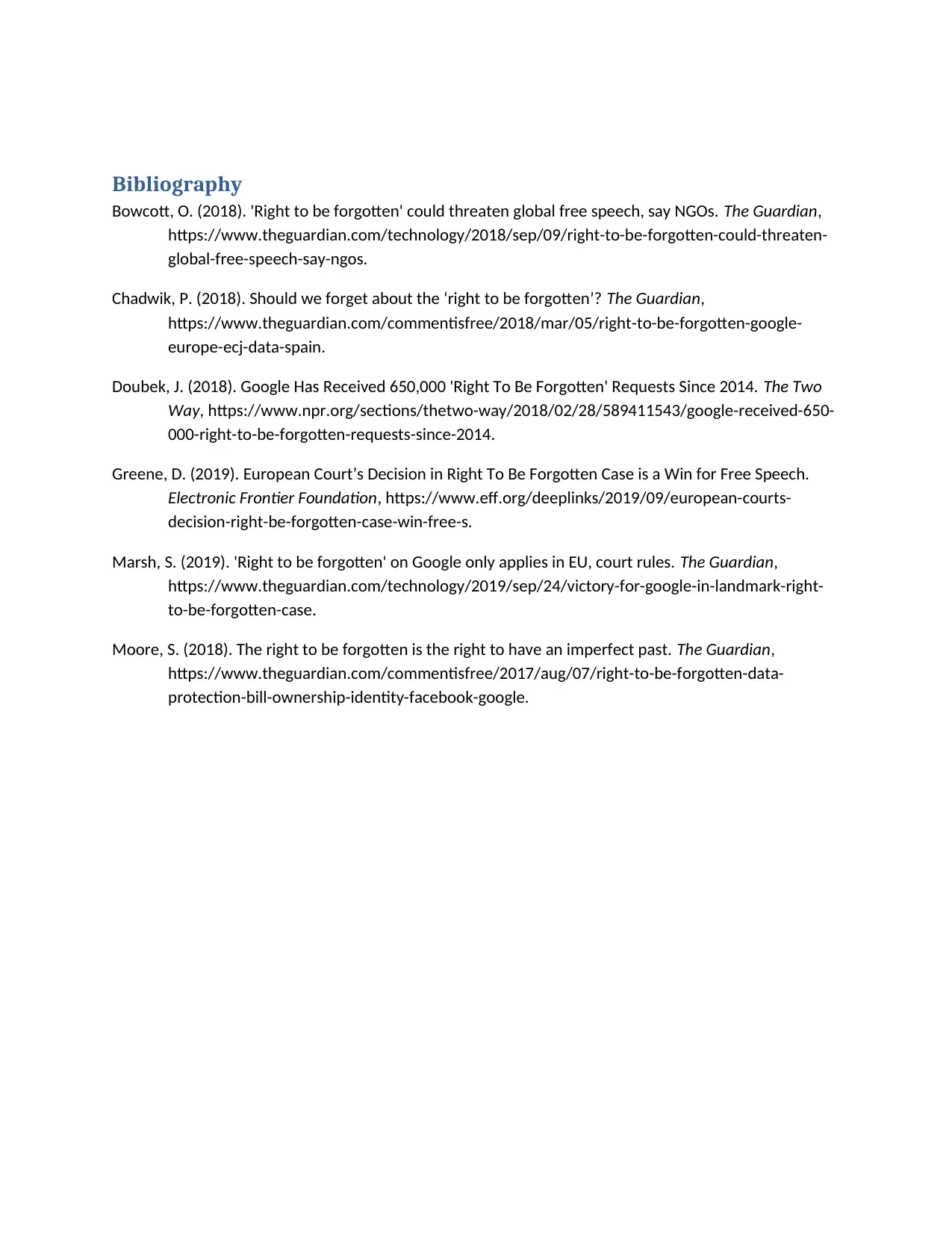
Bibliography
Bowcott, O. (2018). 'Right to be forgotten' could threaten global free speech, say NGOs. The Guardian,
https://www.theguardian.com/technology/2018/sep/09/right-to-be-forgotten-could-threaten-
global-free-speech-say-ngos.
Chadwik, P. (2018). Should we forget about the ‘right to be forgotten’? The Guardian,
https://www.theguardian.com/commentisfree/2018/mar/05/right-to-be-forgotten-google-
europe-ecj-data-spain.
Doubek, J. (2018). Google Has Received 650,000 'Right To Be Forgotten' Requests Since 2014. The Two
Way, https://www.npr.org/sections/thetwo-way/2018/02/28/589411543/google-received-650-
000-right-to-be-forgotten-requests-since-2014.
Greene, D. (2019). European Court’s Decision in Right To Be Forgotten Case is a Win for Free Speech.
Electronic Frontier Foundation, https://www.eff.org/deeplinks/2019/09/european-courts-
decision-right-be-forgotten-case-win-free-s.
Marsh, S. (2019). 'Right to be forgotten' on Google only applies in EU, court rules. The Guardian,
https://www.theguardian.com/technology/2019/sep/24/victory-for-google-in-landmark-right-
to-be-forgotten-case.
Moore, S. (2018). The right to be forgotten is the right to have an imperfect past. The Guardian,
https://www.theguardian.com/commentisfree/2017/aug/07/right-to-be-forgotten-data-
protection-bill-ownership-identity-facebook-google.
Bowcott, O. (2018). 'Right to be forgotten' could threaten global free speech, say NGOs. The Guardian,
https://www.theguardian.com/technology/2018/sep/09/right-to-be-forgotten-could-threaten-
global-free-speech-say-ngos.
Chadwik, P. (2018). Should we forget about the ‘right to be forgotten’? The Guardian,
https://www.theguardian.com/commentisfree/2018/mar/05/right-to-be-forgotten-google-
europe-ecj-data-spain.
Doubek, J. (2018). Google Has Received 650,000 'Right To Be Forgotten' Requests Since 2014. The Two
Way, https://www.npr.org/sections/thetwo-way/2018/02/28/589411543/google-received-650-
000-right-to-be-forgotten-requests-since-2014.
Greene, D. (2019). European Court’s Decision in Right To Be Forgotten Case is a Win for Free Speech.
Electronic Frontier Foundation, https://www.eff.org/deeplinks/2019/09/european-courts-
decision-right-be-forgotten-case-win-free-s.
Marsh, S. (2019). 'Right to be forgotten' on Google only applies in EU, court rules. The Guardian,
https://www.theguardian.com/technology/2019/sep/24/victory-for-google-in-landmark-right-
to-be-forgotten-case.
Moore, S. (2018). The right to be forgotten is the right to have an imperfect past. The Guardian,
https://www.theguardian.com/commentisfree/2017/aug/07/right-to-be-forgotten-data-
protection-bill-ownership-identity-facebook-google.
Paraphrase This Document
Need a fresh take? Get an instant paraphrase of this document with our AI Paraphraser
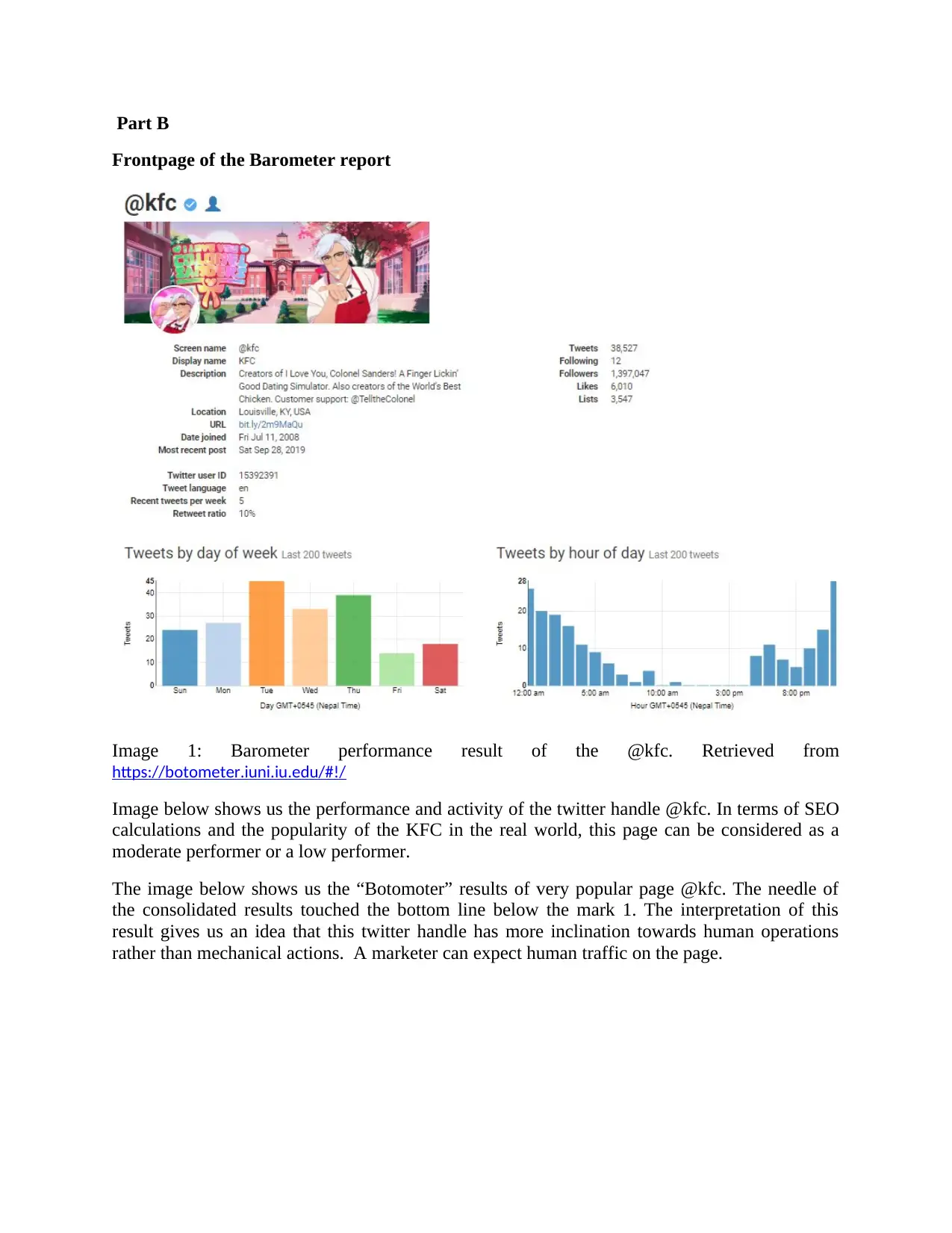
Part B
Frontpage of the Barometer report
Image 1: Barometer performance result of the @kfc. Retrieved from
https://botometer.iuni.iu.edu/#!/
Image below shows us the performance and activity of the twitter handle @kfc. In terms of SEO
calculations and the popularity of the KFC in the real world, this page can be considered as a
moderate performer or a low performer.
The image below shows us the “Botomoter” results of very popular page @kfc. The needle of
the consolidated results touched the bottom line below the mark 1. The interpretation of this
result gives us an idea that this twitter handle has more inclination towards human operations
rather than mechanical actions. A marketer can expect human traffic on the page.
Frontpage of the Barometer report
Image 1: Barometer performance result of the @kfc. Retrieved from
https://botometer.iuni.iu.edu/#!/
Image below shows us the performance and activity of the twitter handle @kfc. In terms of SEO
calculations and the popularity of the KFC in the real world, this page can be considered as a
moderate performer or a low performer.
The image below shows us the “Botomoter” results of very popular page @kfc. The needle of
the consolidated results touched the bottom line below the mark 1. The interpretation of this
result gives us an idea that this twitter handle has more inclination towards human operations
rather than mechanical actions. A marketer can expect human traffic on the page.

⊘ This is a preview!⊘
Do you want full access?
Subscribe today to unlock all pages.

Trusted by 1+ million students worldwide
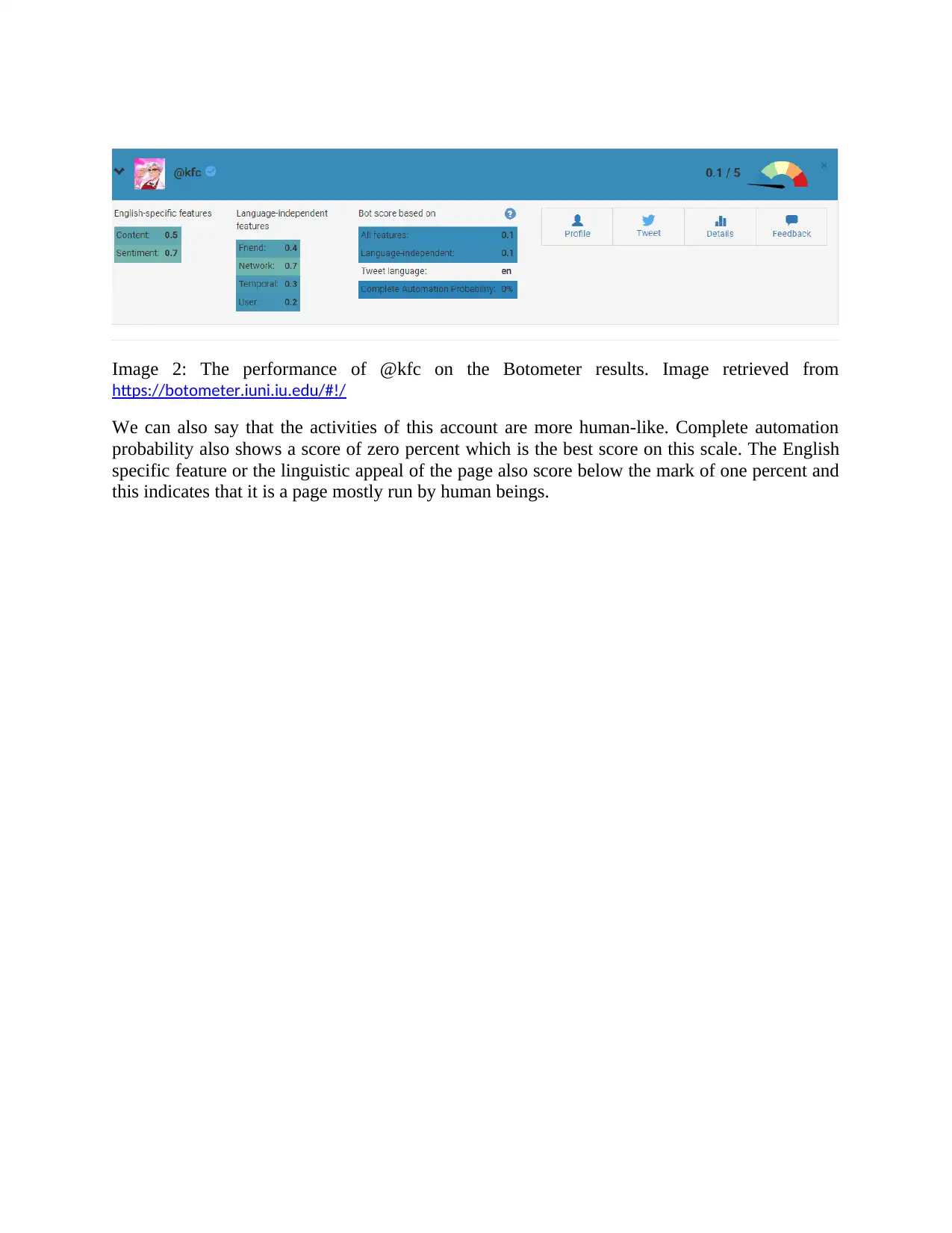
Image 2: The performance of @kfc on the Botometer results. Image retrieved from
https://botometer.iuni.iu.edu/#!/
We can also say that the activities of this account are more human-like. Complete automation
probability also shows a score of zero percent which is the best score on this scale. The English
specific feature or the linguistic appeal of the page also score below the mark of one percent and
this indicates that it is a page mostly run by human beings.
https://botometer.iuni.iu.edu/#!/
We can also say that the activities of this account are more human-like. Complete automation
probability also shows a score of zero percent which is the best score on this scale. The English
specific feature or the linguistic appeal of the page also score below the mark of one percent and
this indicates that it is a page mostly run by human beings.
1 out of 7
Your All-in-One AI-Powered Toolkit for Academic Success.
+13062052269
info@desklib.com
Available 24*7 on WhatsApp / Email
![[object Object]](/_next/static/media/star-bottom.7253800d.svg)
Unlock your academic potential
Copyright © 2020–2026 A2Z Services. All Rights Reserved. Developed and managed by ZUCOL.